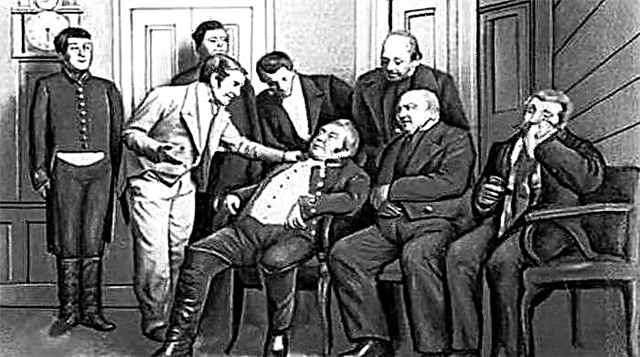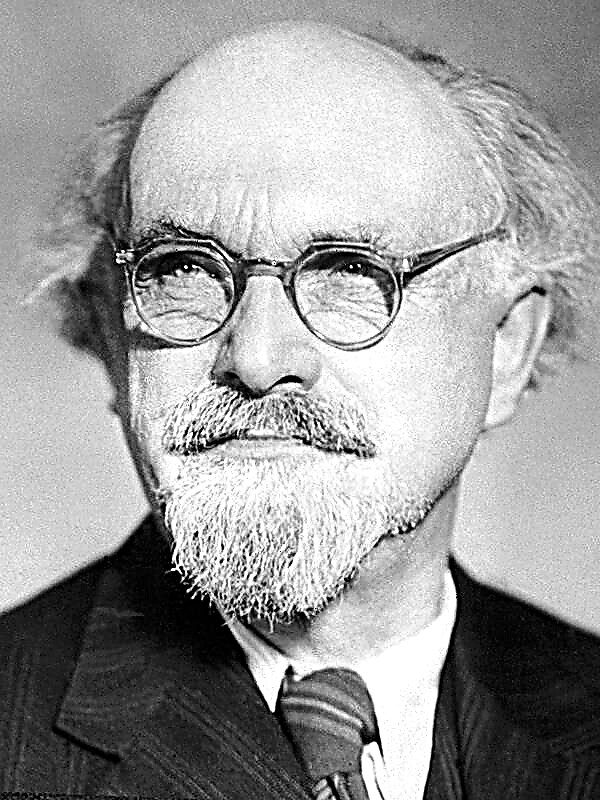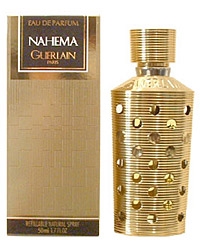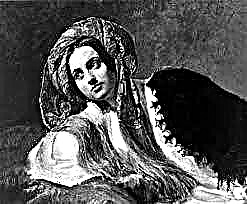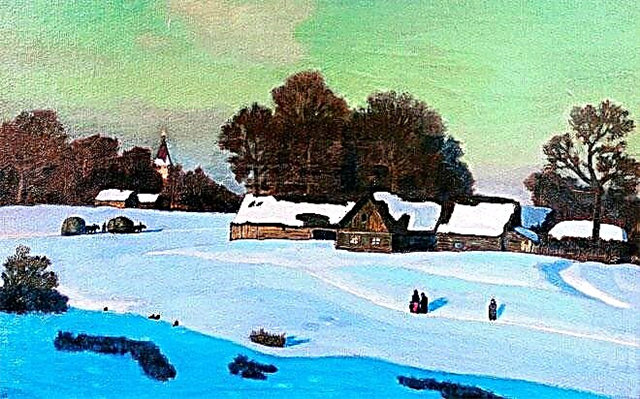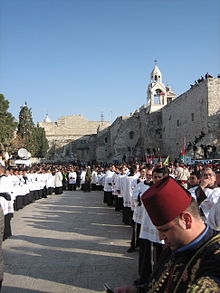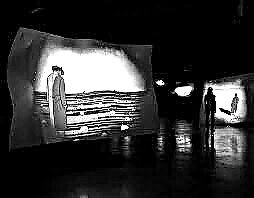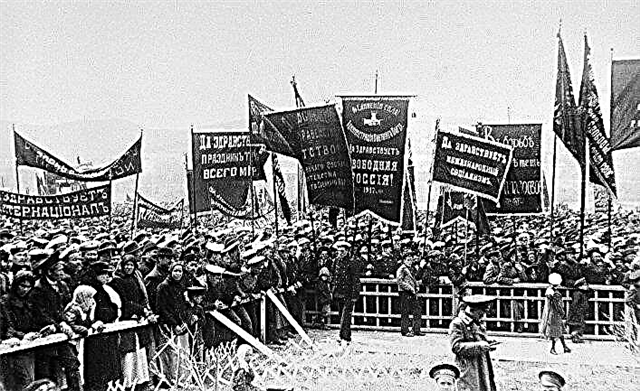The scene of the novel is the author’s homeland, the forests of the southern province of Verend, or rather, the village of Brendabol (fictitious name). People living in the twelve courtyards of Brendabol become dependent on a new neighbor - the landowner Kleven who came from Germany: he serves at the court of the Swedish Queen Christina and introduces a new order in the district - serfdom.
Kleven acts with the self-confidence inherent in a person with unlimited power. First, he is given the right to collect taxes, then the right to the working time of peasants: a little more - and all of them will become his serfs. Realizing the depth of the danger that awaits them, the villagers swear an oath to protect their ancient liberties: they will seek the intercession of the queen, and if necessary, they will take up arms. However, the local head of administration, the Fogt serving the landowner, takes the peasants with a trick: after waiting a while, he enters the village in the early morning with a detachment of Reytars. Taking advantage of the surprise and threat of the use of force, he forces the local elected elder, Jon Stonge, to accept corvee. Then, with the help of the headman, he forces one of the men of the village to agree, with the exception of two: the hero of the novel - a young bond (peasant) Svede and a local blacksmith-gunsmith. In Svede's house, the Fohtu and the soldiers are also stocked with surprise - the owner meets them with weapons in their hands , will mutilate one of the Reitars, who raised his hand to him, and goes into the forest. And now a focht is settling in his estate: from here he oversees the peasants: instead of working in their own fields, they now go to corvee (erecting a new house for the German Kleven), as a result of the hungry winter just experienced by the village, it goes into hungry summers and autumn.
However, at heart, the peasants of Brendabol remain unbroken, they are sure: the lost liberties will be returned - either by the queen, or they will return them themselves. If only to do this with the least losses - freedom is not for the dead for the dead. And then a relay race (peasant “stafet”) is secretly delivered to Brendabol - a wooden board with a elbow long, charred and bloodied, with a sign cut out on it - a paintbrush. In other, prosperous times, once every few years, another relay race was passed through the villages of the okrug - a burning torch, from the fire of which the stoves were re-lit - the “new fire” helped discard the memory of the misfortunes experienced by the owners and forget about their mistakes. At the same time, when the peasant community was seriously threatened by the enemy, a “staff” - a call for rebellion and unity - was launched, it was transmitted from village to village by horse or foot, night or day, in person or on behalf. But the “staff”, delivered to Brendabol, was not lucky: he fell into the hands of the same elected elder, Yong Stong, who had already lost the focht once. Having weighed all the pros and cons, the judicious elder celebrates a coward this time too: he buries the “staff” into the ground, which is also not easy for him — the detained “staff” was punishable by death as usual. But hiding the “staff” from the authorities also deserves execution. From now on, the headman lives in constant fear: the cursed board will either be dug out of the ground by a non-ringed pig, or it will be washed out by an underground spring found in this place.
Double-dealing does not bring elders happiness. From the yearning for the Svedie who had gone into the forest, the daughter of the elder Bottila almost goes mad. The father refused the word given to him by the News, now he promises his daughter’s hand to another. In addition, the walking village widow Annika accuses her of witchcraft and secret relations with the Unclean - otherwise why would she go to the forest, where obviously there can be no one? In total despair, Bottila puts her hands on herself. However, the headman is ready to lose his daughter rather than give her to the hated News - he envies the decisiveness and inner freedom of the young bond. Even the food, which is now standing in the house, thanks to the patronage of the Focht, is more than enough, it does not please him: all of it is consumed by long and white worms that have been set up in the warden's womb. And in the literal, and figurative sense, something is gnawing from the inside.
But Svedie, who left the village, kept the peace in his soul, although he was also struggling on the run: he lives alone in a fox hole among the rocks, until he finds another outcast - the village thief, whose name is Ugg Blesmolsky thief. Uggge is a great master in his profession, he is not without a kind of morality: he steals only from the rich, distributing part of the booty to the poor. Uggge saves nearly died in the forest from Svedie disease, which previously did not want to know him. But the experienced and dodgy thief has his own weakness - excessive self-confidence: why he dies at the hands of Bezukhovy - another outcast, albeit a completely different type. Bezukhiy is a local executioner who agreed to this position for forgiving him an accidental murder (in memory of which his ear was still cut off). Thus he saved his life, but he hated the whole world. Beckless did not pay the corrupt girl, earning her craft to feed the sick and poor parents. Uggge reproached this Bezukhovy and got a knife in the back.
A true peasant, Svedie sacredly believes in justice, it is immutable for him, like the daily path of the sun from east to west or the innocence of his bride Bottila, with whom he shares the bed at night, without touching it before the wedding. The newsman believes that the efforts of the local priest, whom his mother turned to, will not go in vain and the petition describing the injustice committed against him will reach the queen. Bad news (Queen Christine at the Estates Cathedral in 1650 completely took the side of the nobility, refusing to help the petty clergy and peasants) compel him to take the matter of restoring justice into his own hands. The news openly calls Kleven to a duel: he knocks on his estate at night to call the landowner to account, but the frightened servants say: Kleven is far away, he is at court in Stockholm. Having learned about the threats of Svedie, Kleven takes them seriously: he asks the local authorities to judge the fugitive in the forest and begin his search. In the end, the Newsletter was overlaid like a wolf in a winter swamp, wounded with a shot from a musket and buried - by court order! - still alive in the ground.
Nevertheless, the justice in which the Swede believed was ultimately restored. Jon Stong managed to hide the “staff” from the community. But instead of him, a new one appears in the village: the men of Brendabol made it on their own initiative - the relay race was nevertheless passed on.


